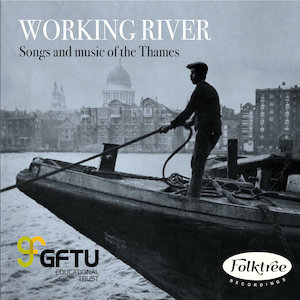
Various – Working river: Songs and music of the Thames
Folktrees Recordings/General Federation of Trade Unions – 15 October 2020
The River Thames has long been a source of inspiration for writers, artists, and musicians. Running from the hills of Gloucestershire for over two hundred miles until it emerges into a saltwater estuary between Essex and Kent, its history flows in full conflux with the growth and development of London itself.
This is worthy release, a collaboration between Folktree Recordings and the General Federation of Trade Unions, to ‘discover, collect, record and popularise the songs and music of working people that live and work on one of the world’s most famous rivers’, is a fine collection of some of the songs and tunes that captures the history of one of the most vibrant and historic rivers in the world.
These are the songs of the people: working stories, and lives lived on the river, so narratives take us from tales of men unloading barges, lovers meeting at the shore, the history of the Nore mutiny, the London Dock strike of 1889, smugglers, shipwrecks, sailors, drinking and even a day trip to Southend.
It is a mix of new recordings, mainly traditional with some well-chosen interpretations of songs by Ewan McColl and many others, with some recorded in the last four or five years and taken from other albums. Attention here is on the song and its story with a focus on a stripped back and generally live sound.
The twenty-one tracks have been chosen with a keen eye for history by Working River curator Brian Denny, who also performs the track ‘Lizzy Little’ here, a surprisingly sweet little song on a 19th-century smuggler. Denny also provides a well-researched introductory essay.
Adam Rees opens the album with a stripped-back version of ‘Lighterman Tom’, only Rees’s voice and banjo are present, and an informal, organic recording it is too. Intimacy is present too on other tracks, listen to Bill Pardon’s ‘Strike For Better Wages’, a traditional song first collected by Ewan McColl in the 1950s but reportedly dating back to the 1880s. It opens with Pardon’s mouth organ before shifting purely on his voice. It is a raw, evocative delivery. Listen also to Anne Dearman’s clear vocals and Steve Harrison’s melodeon on ‘Death of Parker’, a simple, sensitive recording which perfectly captures the history and mood.
There are a few tracks which break out with larger groups. The Hoy Shanty Crew provide a rousing, version of ‘Day-trip to Southend’, a fun little tune on the misadventures of a family’s holiday, whilst the Pete Dunhill Choir take on ‘The Match Girls Song‘ from the 1880s, which riffs on the abolitionist ‘Battle Hymn of the Republic’.
Crafting for Foes version of ‘The Wreck of the Princess Alice’ is a poignant and haunting narrative on the almost forgotten tragedy of the largest loss of life on the Thames when an estimated 600 and 700 people lost their life in 1878. Amanda McManus’s sensitive vocals beautifully accompanied by Adam Rees’s banjo.
Dan Forbes delivers a charming little tribute to the ‘Mudlarks’ of the Thames, whilst Ossie and Dave’s ‘London is the place for me’ brings the story up to the Windrush generation with a bright cover of the calypso first performed by Aldwyn Roberts in 1948.
Kitti Theobald’s ‘My River’ is a striking live recording, wonderfully accompanied by the patrons of the pub at the Leigh Folk Festival in 2015 where it was recorded. It perfectly captures how these traditional songs still have a vibrancy; a vital, living, communal legacy.
Quite rightly Working River concludes with Jack Forbes and Friends singing ‘Rolling Down the River’. Originally recorded in 2015 during an evening to honour Roy Palmer whose collecting of traditional songs and tunes partly inspired this release. It is an effective, resilient, powerful conclusion to what is an essential collection.
If there is a criticism, it is that it would be nice to have more history on each track and artist. Often there is only one line on a song’s history, which is a shame considering the significance of history to the recordings, however, this simply encourages listeners to, as Denny notes, ‘get digging and see what you can find.’ With plenty more songs and tunes to tell the story of Father Thames and its people, a follow-up would certainly be welcome.
Order via Bandcamp: https://folktreerecordings.bandcamp.com/album/working-river-songs-and-music-of-the-thames
Also, listen to a special Union Dues Podcast on which Simon Sapper chats with Brian Denny, curator of the Working River collection of songs and music from those who live and work on the Thames.

